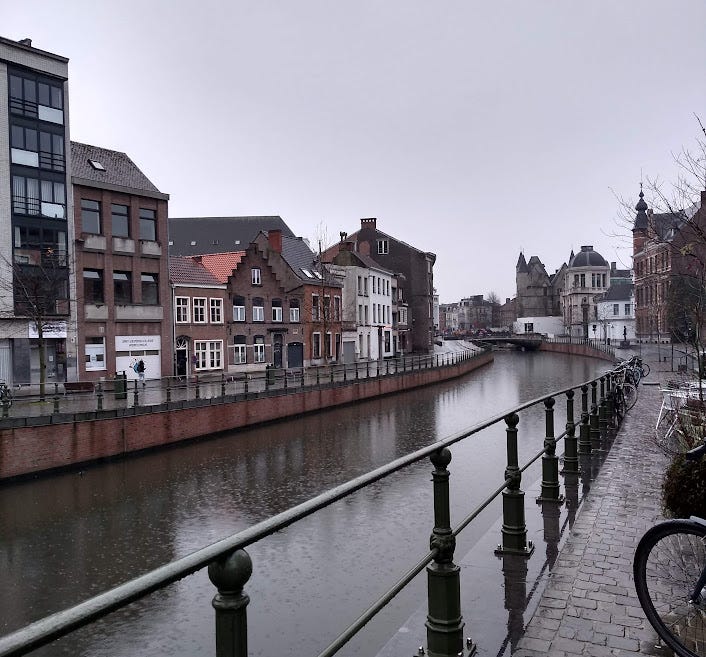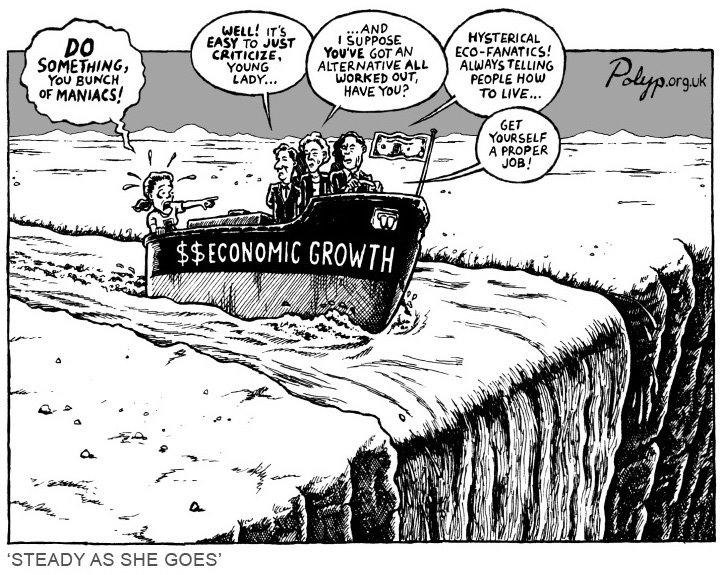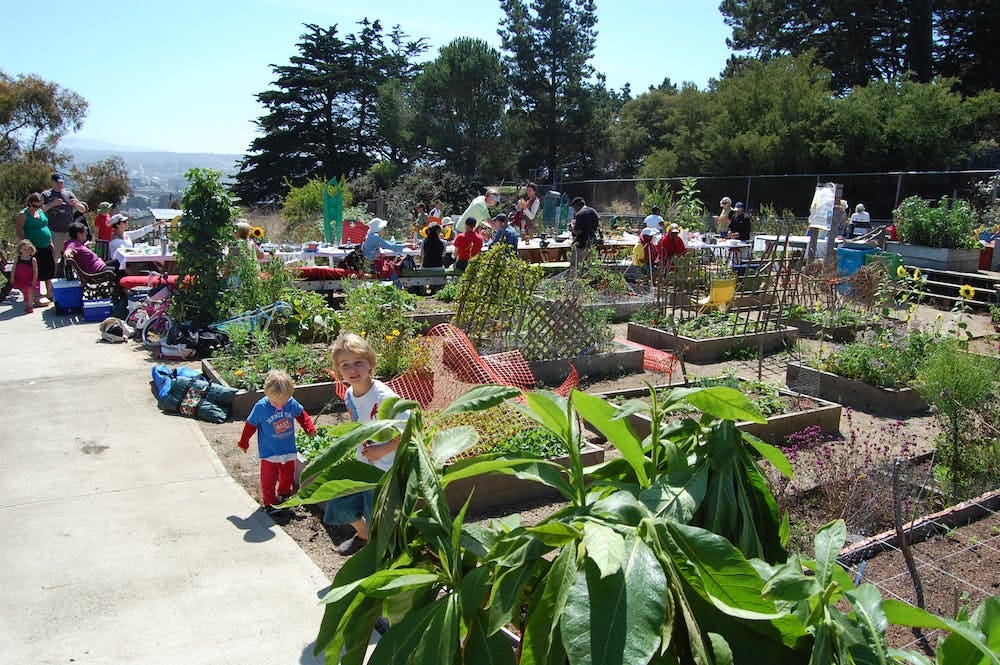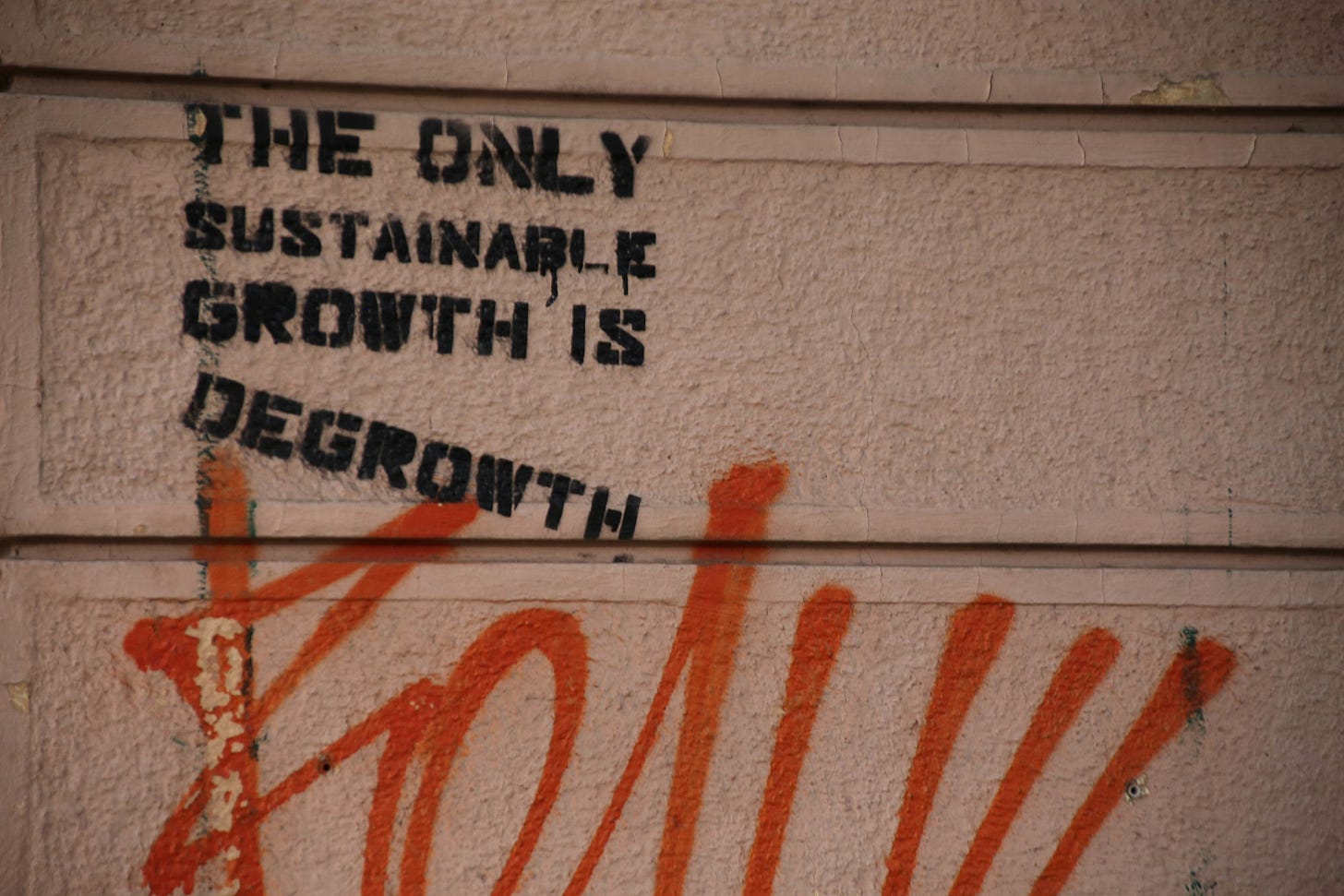So we're supposed to think that working overtime for little pay is 'inspirational'?
Capitalist economics doesn't work - but we do. CONSTANTLY.
A thought interrupted me the other day. I thought, I could be satisfied with this.
This thought is foreign to me. Like many of you, I worry I’m hardwired to be dissatisfied. With my own work, with my life, with - I don’t know what but there’ll be something I’m obsessing about.
I got hired to write a report - it has to be the best report. I went to dance class and sucked at it - so I wanted to practise every day until I became the best.
Then I was hanging out in a park on a static cloudy day with a friend and we went for coffee. And I thought, I could be satisfied with this.
I don’t know what to do with this thought. There is no time for contentment in a world with so much that needs changing. No time when I’m contemplating whether I should start buying fancy skincare products to look better and the gym subscription to be fitter and train tickets to be more worldly and that paid mindfulness app to be calmer and hopefully just a better person.
No time for satisfaction when I have that deadline on Friday but if I get it done sooner and do extra then maybe my client will be extra-impressed and leave a LinkedIn testimonial and maybe then I can do follow-up work for them and for others and maybe if I do enough press releases, I can afford all those bills and subscriptions and the world will be fixed and-
Well, I wrote about what happens when we fall down the more-is-always-better mentality.
And then another time I spent an hour of the work day walking home from town because my bike broke down and I was so behind on deadlines that it felt faintly ridiculous and moments of sun pierced through the January cold and I thought, yes, I could be satisfied with this.
Yes, maybe the need for growth was misdirected. The painful work to increase my bank balance and sense of validation seems to leave me poorer in time, energy and happiness.
Maybe I am already capable of satisfaction, maybe we all are. With a small space to call my own and a warm cup of tea and the time to worry about the laundry and wonder what my friends are up to. Days to go outside just because the weather’s nice and days to sleep while the world heaves outside and the tides, they keep changing. Growing less to grow more. Sounds kind of nice.
Help keep the Green Fix running! The newsletter is volunteer-run. If you find this newsletter useful, please consider tipping a virtual coffee.
You can also help by sharing the newsletter:
What’s Going On?
Society isn’t changing fast enough to reach 1.5C targets, new study shows.
Related: How war, politics and business are making the 1.5C target far-fetched.Planting more trees could decrease deaths from summer heatwaves in cities by a third, modelling study suggests.
Useful: Why are cities hotter than rural areas?Exxon and Chevron make highest-ever profits in 2022 in the midst of an energy and climate crisis.
Related: Oil giant’s plans for expansion ignore net zero goals.In Brazil, forests returned to indigenous communities are thriving.
Related: Meanwhile, deforestation rages in Amazon despite Lula’s conservation pledges.New wind and solar are cheaper than operating costs of almost every power plant in the US.
Related: Here’s how solar and wind generated more electricity than gas in the EU last year.
Focus On… Degrowth
Cass Hebron, Editor of The Green Fix, chats to Saskia Van Dijk about degrowth.
My name is Saskia Van Dijk and I have been an active member of Degrowth Vienna for a year now. We are a collective of activists, young scholars, organisers and professionals.
One of our aims is to introduce degrowth into political and societal discussions around responses to multiple crises.
What do we mean by degrowth?
By degrowth we mean the planned reduction of economic throughput [amount of work done or produced in a particular span of time]. This refers to resource, material and energy use that can ensure a good life for all people within the ecological boundaries of our planet.
Economic growth requires us to constantly produce and consume more, and we know that on a finite planet that’s not sustainable. We also know that such growth is rooted in the exploitation of people and nature.
Degrowth is a critique of the capitalist pursuit for infinite economic growth. It’s also an attempt to formulate alternative economic models which instead of profiting growth, centre things like care, public goods and services, autonomy and time welfare.
[Useful: What is capitalism?]
To address global economic inequalities and give everyone the chance to afford a good life, don't we need a certain level of economic growth?
That’s a crucial question. We live in a society where there is a belief in a neoliberal idea of a meritocracy where we earn based on our skills. But this doesn’t work - capitalism has generated gross inequalities.
We have been conditioned to associate growth with progress, so people assume we will have less if we degrow. However a growth-based system is not a guarantee for improving peoples’ lives.
We are seeing health systems crashing around us, fossil fuels companies making record profits while many people are unable to afford heating and good quality of food. This is linked to the welfare state being coupled with GDP (Gross Domestic Product) growth and private interests.
To achieve a good life without inequality, degrowth models say that we must separate economic growth and social infrastructures, making welfare available unconditionally. This would lead to better lives for all, without the destruction of the environment and exploitation of people.
Between 1995 and 2021, the bottom 50% of the world population captured 2% of global wealth whereas the top 1% retained 38% of the global wealth generated by economic growth.
We have to let go of the idea that the economic benefits from growth trickle down to the global population.
[Read more: What Is trickle-down economics?]
What would my incentive be to work if I can't increase my income beyond a certain point?
This is a very bleak picture being painted if we ask what other reason do we have to do things if not for economic benefits? Humans are social creatures, they need things to do with their lives, and the Easterlin paradox shows us that past a certain income, happiness does not necessarily increase.
Degrowth envisions different concepts of prosperity than our current economic system does. Prosperity could include the freedom to choose our occupation, to choose when we practise it and to be supported rather than punished when we need time off to take care of others or ourselves.
This should be backed by universal basic services (or income) so as to make sure that people are able to meet their fundamental needs (food, care, housing) independently of how much wage work they do.
Degrowth wants to move away from the current work ethos of incentivisation based on performance that creates so-called bullshit jobs and causes people to be overworked yet still live paycheck to paycheck.
Instead we could shift towards jobs that are socially useful, not destructive of the environment and that are structured more democratically, allowing workers to participate in decision-making and ownership of their organisations.
We can also evaluate what kinds of work are keeping society running, like healthcare, child rearing, cleaning services, and which are actually detrimental like speculative finance, advertisement and corporate lobbying?
This all sounds idyllic but capitalism is so entrenched in our daily lives. How realistic is degrowth?
Political theorist Frederick Jameson said ‘It's easier to imagine the end of the world than the end of capitalism.’ But degrowth is making an entrance in the mainstream consciousness.
Degrowth is challenging capitalism and the myth of green growth, the assumption that we can innovate our way out of the climate crisis with new technologies and still prioritising economic growth.
Jason Hickel, a degrowth scholar, calculated that to eradicate poverty at $5 a day, global GDP would have to increase to 175 times its present size. So that means we would need to extract, produce and consume 175 more than we do now. So, how realistic is the way we are operating now?
How can I support degrowth values?
Degrowth itself is an academic and activist movement but its values are found in many existing initiatives such as anti-extractivist movements, food cooperatives or anti-car activism. Degrowth values can also be incorporated daily in our lives, with practices such as growing one’s own food, reusing or repairing used goods or going against planned obsolescence of electronic appliances.
[What is planned obsolescence? We wrote about it]
There are many ways to be involved in an effort towards a degrowth society and promoting such values. We have also published a book about degrowth strategies for anyone wanting to get more of an idea of how we might start moving towards social-ecological transformation.
You can follow Degrowth Vienna on Instagram and Twitter and check out the global degrowth movement here.
So Now What Do I Do?
LEARN MORE
Watch: How we end consumerism.
Listen: ‘What does system change have to do with the climate crisis?’ New podcast episode for Climate Action Network’s new series!
TRY SOMETHING NEW
Join the UN’s countdown to International Women’s Day with weekly online activities and tips to integrate gender equity into your life.
Join Youth & Environment Europe as a volunteer liaison officer for their work on green cities! Deadline 10th Feb.
Tune into this online panel on what a sustainable food system would look like, by Oxford Martin School. 22 Feb.
CHANGE THE SYSTEM
EU politicians are about to vote on business accountability. Use this tool to tell your MEP to hold companies accountable for their climate impact!
Aged 18-30? Applications are open to attend the European Youth Event in Strasbourg this June!
Sign the petition to kick fossil fuel lobbying out of politics!
By the way…
The Green Fix is now offering low-cost sponsored slots on the newsletter. Book your slot here.
If you have a topic you want the Green Fix to cover, fill out this feedback form & tell us your idea!
Stay in the loop
You can also follow the Green Fix Twitter and LinkedIn page here for more climate opportunities. You can also connect with me on Instagram, Twitter and LinkedIn.
Know someone interested in environmental issues? Forward this email to them - we want to reach people who care about doing more for the planet, with your help.











